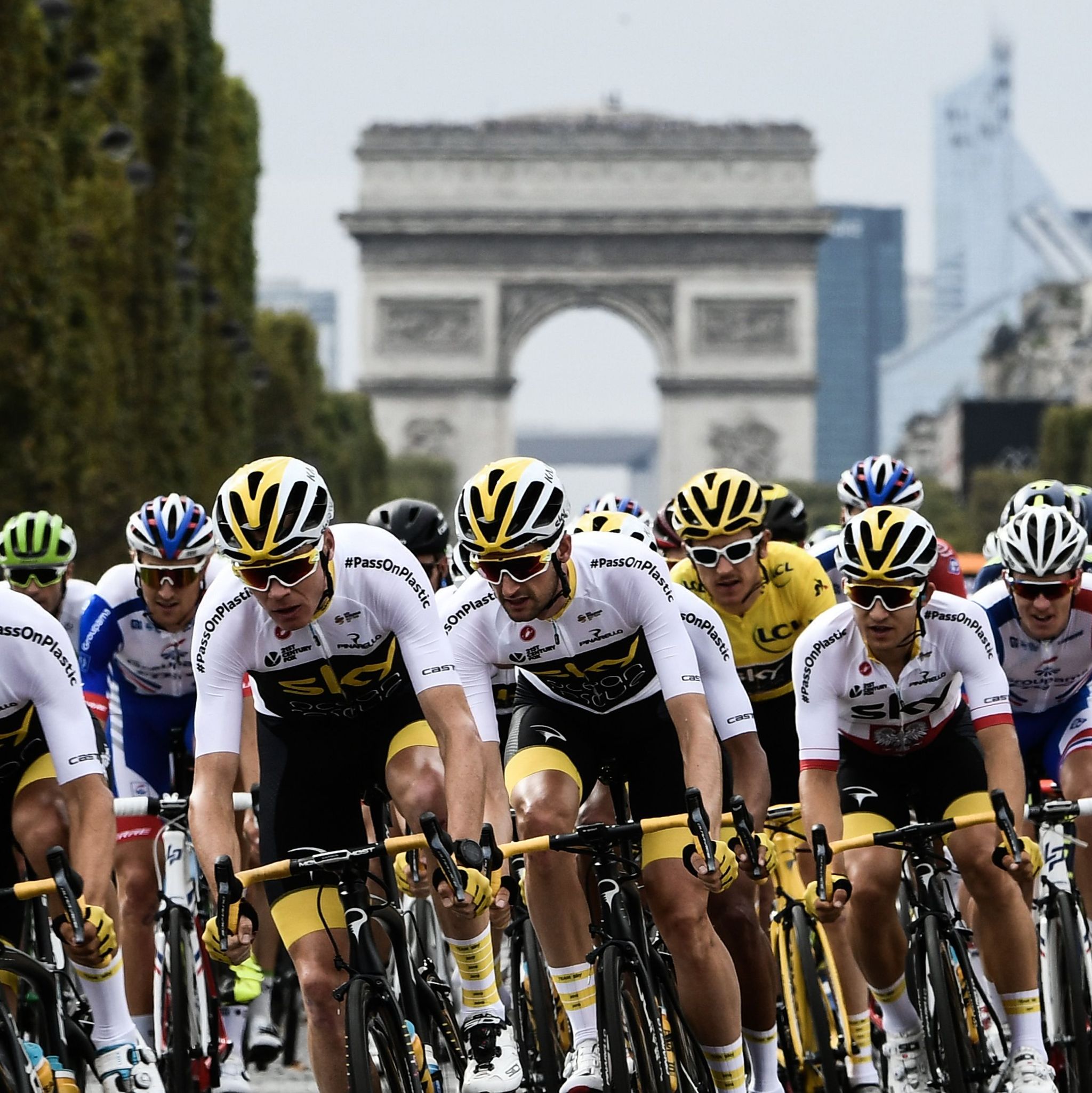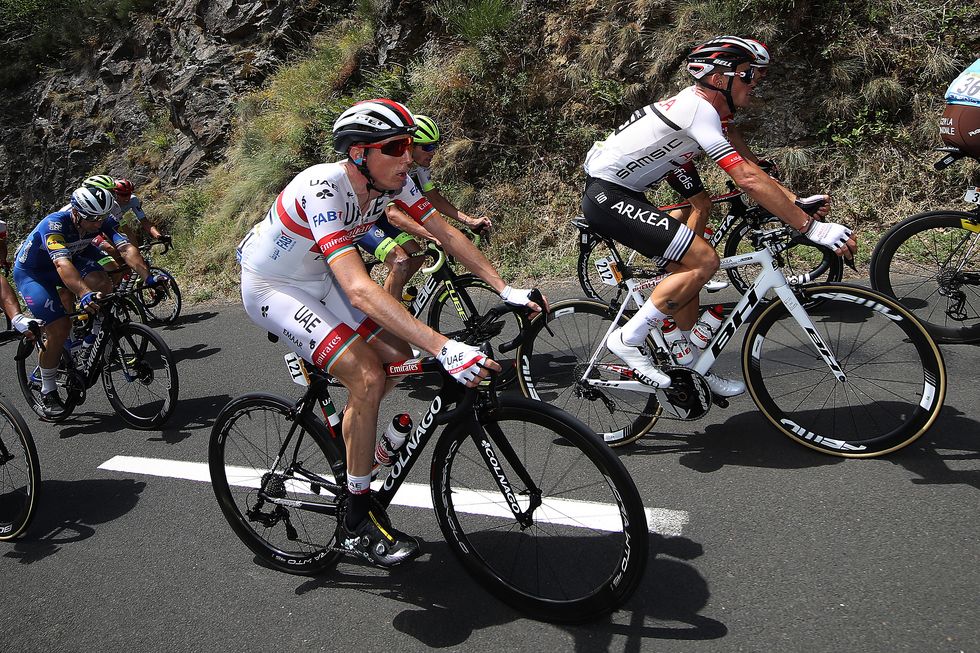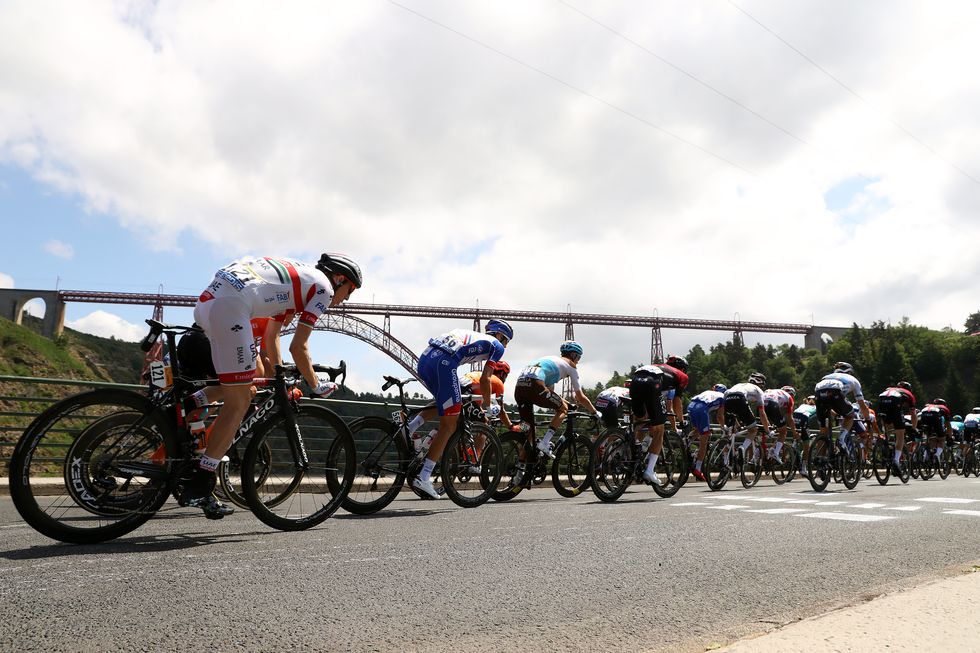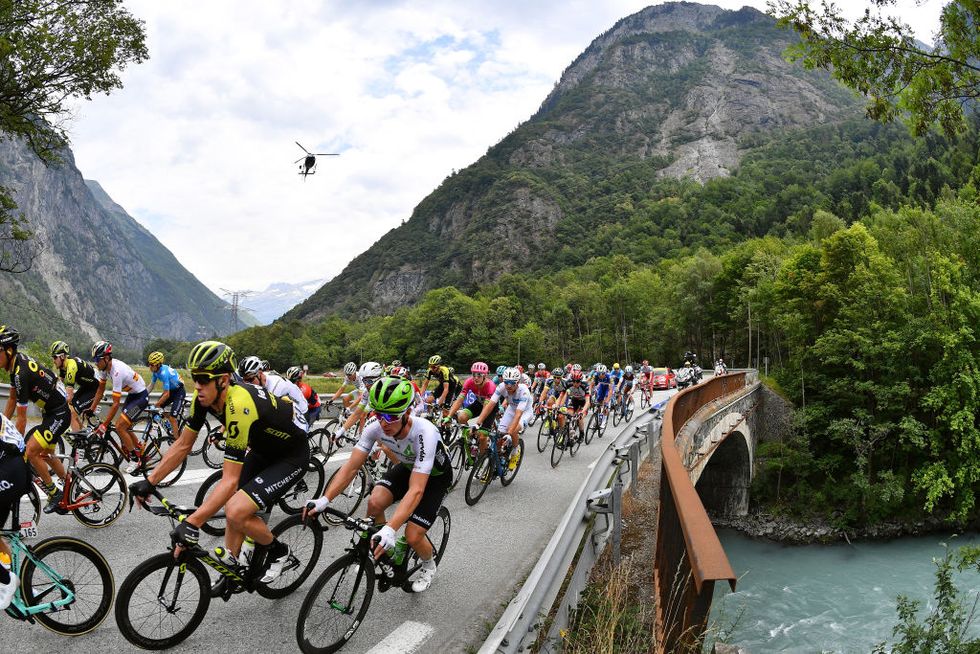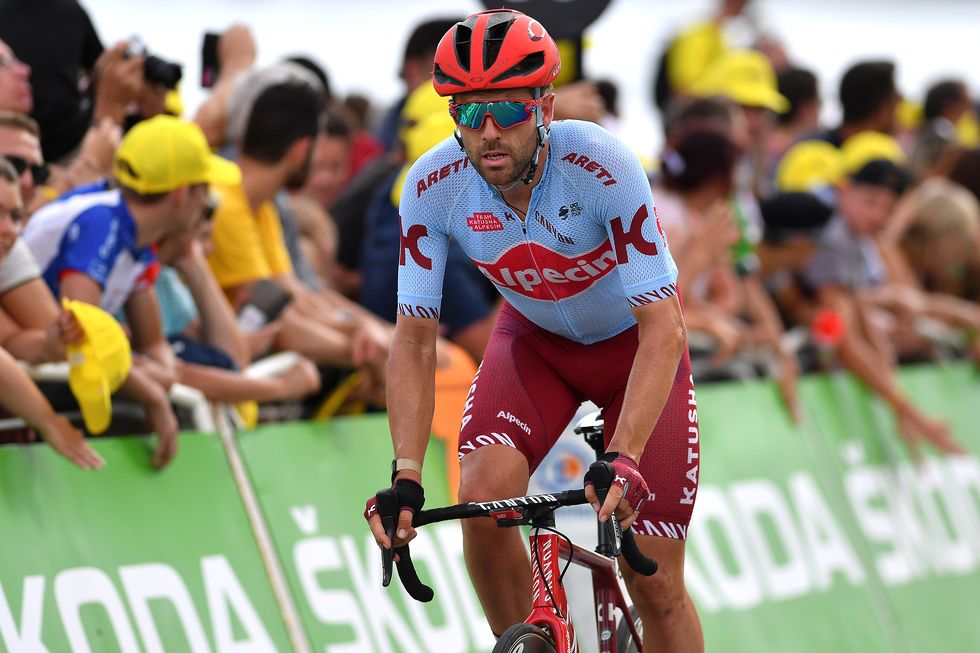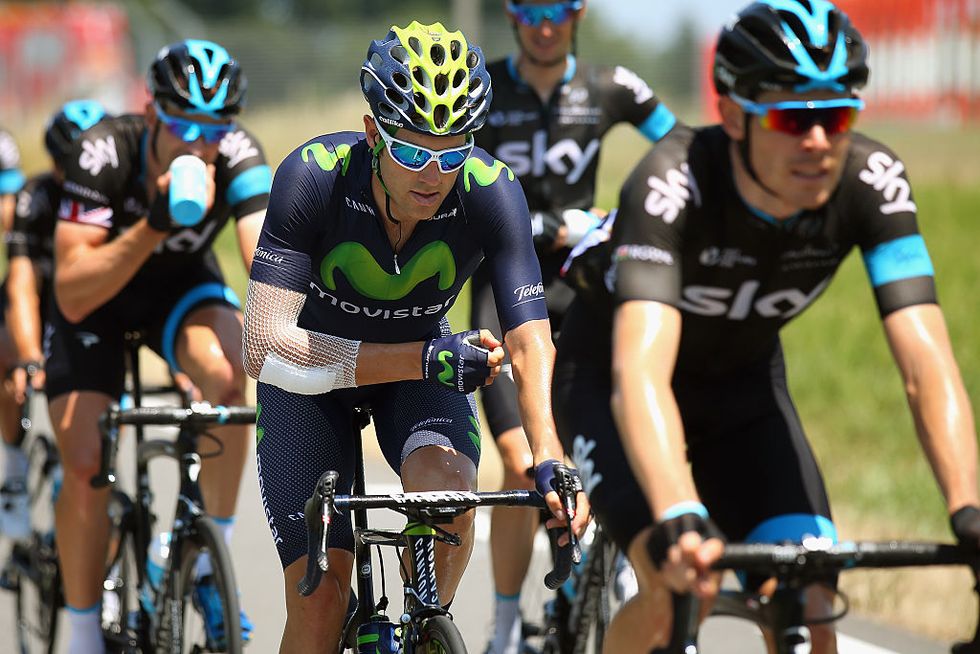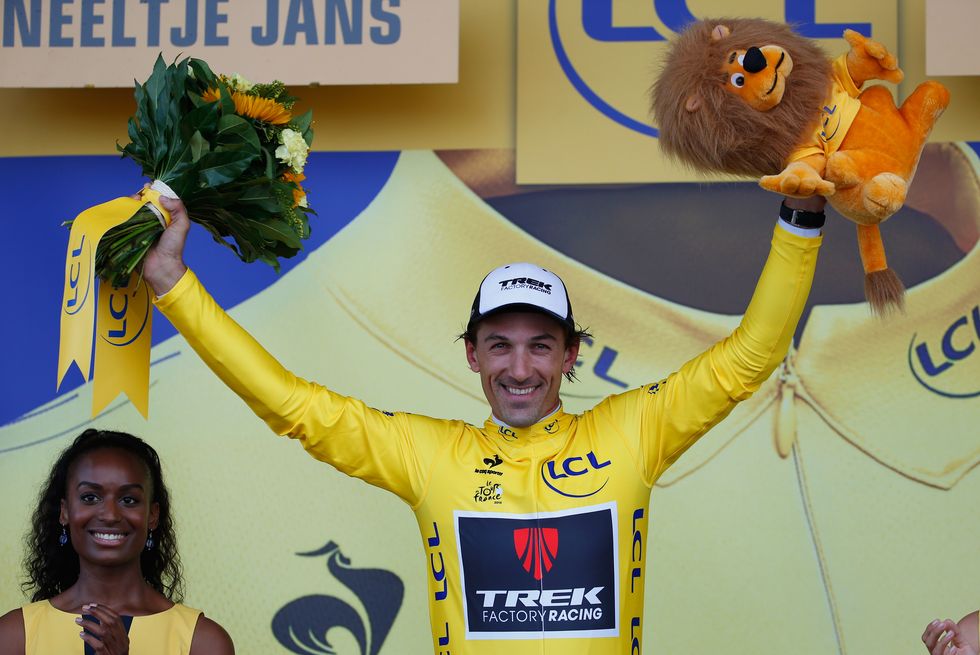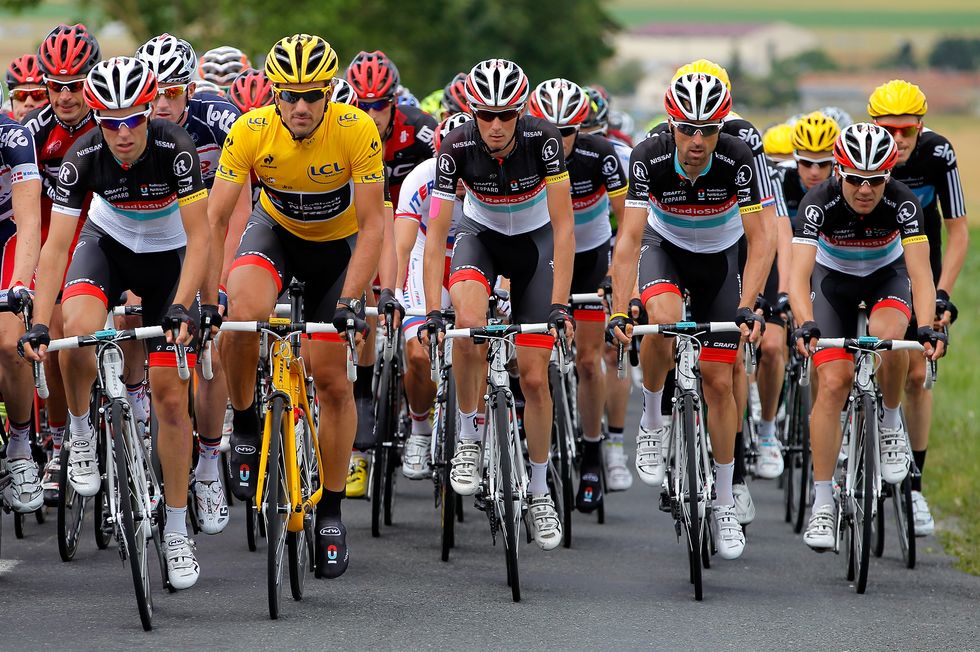Elite athletes are, as a rule, very similar. Sure, they might excel in different sports. They might take different tactics and attitudes and motivations. But all of them have the inner steel to force themselves and their bodies to the extremity of achievement, and all are faced at some stage with having to explain to some layman what it's like to be an elite athlete at an elite event.
The Tour de France is the most prestigious event in cycling partly because it's the hardest. But why is it the hardest? As this year's Tour reaches its climax, we spoke to three elite cyclists - Fabian Cancellara, Alex Dowsett and Dan Martin - who've experienced the Tour at its best and at its worst.
Dan Martin
Martin is currently riding in his seventh Tour de France. He won stages in 2013 and 2018 as well as the combativity award in 2018, and finished sixth in the general classification in 2017 despite a crash which fractured two of his vertebrae.
It is different to every other race of the year. You're under this intense scrutiny for the whole time you're here and just this pressure and the media and travelling - it's so intense, psychologically, it isn't so much the physical effort. It's the concentration that's required to sustain yourself for four weeks and survive in this environment.
The first Tour, literally, I finished thinking I didn't want to do the Tour de France again. I hated every minute. It was just so stressful.
I think the reason that first Tour stunned me a bit was because it was one of the most dangerous tours in the first week. There was a lot of crashes and that's kind of normal to a Tour, but that year was exceptional. It left me a little bit shell-shocked and perhaps physically I wasn't as well prepared with the training and with age as well - you get stronger every year.
I think what people don't understand about the Tour is purely the lack of free time.
That comes back to the psychological fatigue that you accumulate. I'm lucky - being team leader I get my own room to avoid sickness and so I can rest better but all the other guys on the team have to share rooms, so generally you don't get any personal space for that three weeks. You're in small French hotel rooms with a bed about 30 centimetres from your teammate's bed. It just adds to the difficulty.
There's generally a TV camera at breakfast - there isn't really any sanctuary from the attention. Even during the race there's barely a metre of the road that doesn't have somebody standing there watching.
Crashes can happen so much more easily because of incidents with fans. And unlike any other race in the year, everybody arrives at the start of the Tour de France in the best condition possible. And there's no other race like that. You have the best riders in the world in the best shape possible.
In 2013 I remember coming into the bottom of Mont Venteux in the mountaintop finish and my shoulder collided with a fan. It's funny - these things happen at 25 miles an hour and it's almost like slow motion replay in my mind. My shoulder came into contact with the lens of an SLR camera. I remember seeing the camera go - I hit the lens of the camera, and he had it up to his face. This guy must have had a broken nose. He ended up in a ditch.
Incidents like that happen quite frequently and it's quite scary. It shows how vulnerable we are and you need that extra concentration. You have to predict when incidents are gonna happen.
The mood in the peloton depends on the day. I tend to try to stay as relaxed as possible. But other teams, you see them riding together from the very first to the last. Very strict, very regimented. I tend to try and have a chat, to make the time go quicker and try and stay relaxed. That's how I combat that psychological stress.
There's been a generational change. I've raced with many people for many, many years now so there's never a shortage of people to talk to. You can see the younger generation who are perhaps not as talkative or relaxed because they've grown up in this regimented system, of riding all together, riding as a team.
Something you notice on the Tour more than any other race is the incredible camaraderie, especially between the top riders. Even though you're trying to beat each other and you're competitors, there's also a feeling of respect between everybody. It's quite special. It's more that the better riders have a chat together than the teammates, funnily enough.
I had a stage in 2015 where I fell ill and I possibly shouldn't have been racing - I had a fever. It was 40 degrees or something and literally I was counting the kilometres until I could get dropped and still make the time cut. That was just mind over matter, getting to the finish line, and then dealing with it the next day.
After the crash where I fractured two vertebrae in 2017 I honestly didn't feel too bad - my back was a little bit stiff. I think all the muscles kind of locked up around the injury. I never took any painkillers, never. It was a case of if it happens that you can't continue, it doesn't matter. It's really not important. Your health's more important. But as long as you can still pedal...
You work all year for this. The Tour is the one race all year that everybody just wants to finish. Even when you've done it six times as I have, you don't just go home. It's not like other races. You just want to finish. And unless you can't finish, why go home?
Alex Dowsett
Dowsett is riding in his second Tour de France this year. His first ride in 2015 was cut short by injuries sustained in a crash on the fourth stage, and he retired hurt in after stage 12.
My team said, 'Look, we're looking at you for the Tour de France'. And I was like, 'Cool. I'm not ready for that but yeah, I'll give it a good go'. So I went to New York for a couple of weeks training, I got ill whilst I was there. So that didn't really go well. And I went to the Dauphiné which as I relearned this year is just about the hardest one week stage race in the world. It's the warm up for the Tour, and it's also a selection race. And I couldn't finish it.
I organised a holiday because I was like, there's no way - if I can't finished the Dauphiné then there's no way they're going to take me to the Tour. And then I got a call and they were like, "Oh, yeah, you're going to the Tour". I was like, "Really? You're still going to take me?"
With the Tour, they do what you do when you go go-karting - you sit down before and you go through the safety briefing with everyone that's about to do the session. That for me was one of those daunting things because the slightly overweight me back then was basically thinking, 'Who's gonna help me in the grupetto? Who are my allies there?'
I looked up and everyone was good. Every team brings their A-team for the tour, and I was like, Christ, yep - everyone here is seriously good. And everyone looks really skinny. And it was daunting.
When the race relaxes, everyone sort of stops to go for pee while the breakaway goes. I just couldn't believe how stressful that was still. Everything is just more stressful. Everything is faster. I had to panic-pee to get back in the bunch. And then everyone's trying to be at the front all the time. It's the mental stress, actually, that's what sets it apart from any of the other stage races.
You have to pick your time. And if a bunch is doing 60 kilometres an hour, that's not a good time to stop because you lose, you lose huge. To go to zero and then get back up to 60 again, catching up is tough. So once the breakaway's calm, the bunch relaxes. It might be for a minute or two, might be for 10 minutes. I don't know how it happens but, whenever I've watched racing on TV, the helicopters never capture the pee stops. Because sometimes there'll be 30 riders left and the other 170 have stopped for a pee. It's like, how is this not televised?
Some guys can do it whilst riding along. I can do it, but the amount of time it takes me I may as well just stop and go and and then get going again.
I was looking after Alejandro Valverde on the Roubaix stage. Because I was so nervous, I actually listened to him - I went to move up into an impossible gap. And I got shunted off the road and put a hole in my arm.
It was a sharp left, sharp right. There was a gap opened up on the right side of the road as the bunch went left, but inevitably, I then got squeezed off the road when the bunch then went round to the right. The mentality I had in the Dauphiné, I was quite calm and relaxed, I could make good decisions myself. Whereas I got wrapped up in the stress and the nervousness and the responsibility that you have as a domestique to someone like Valverde or [Nairo] Quintana at the time. I panicked and took a risk that I think I definitely wouldn't have done otherwise.
After that I really struggled. I couldn't get my heart rate up. The hole in my arm just wasn't healing - it didn't heal until I pulled the pin on stage 12 and went home. The stitches were holding the hole together. It was a substantial hole. I think it had six stitches in it.
Your body's just under such stress day in day out in the Tour. My body wasn't healing one bit until I went home and stopped and rested. And then it healed up quite quickly.
I was in survival mode then. The next day, I was just hanging off the back for the whole thing, having a really bad time. The first four stages had gone really well, actually. I mean, I was overweight, but I had power. I was fast.
We had this crosswind day in Holland. I was with Nairo [Quintana] in the right position. And I made the front and I think I didn't look behind at the crucial time because it was pandemonium - Nairo just missed it. I'm not saying he would have won the Tour de France otherwise, but the gap that he lost that day was bigger than the gap that he lost the Tour de France by.
If you're not on the limit, you can make decisions with a much clearer mind. Whereas if you're breathing out of every orifice, then making a tactical decision becomes quite difficult, and you end up taking the easiest possible decision rather than perhaps the one that's best for your racing.
Fabian Cancellara
Cancellara, known by fans as 'Spartacus', is one of the greatest riders in history. Now retired, he won two Olympic gold medals and four World Championships.
If you're not ready mentally, I think that is the most difficult. You eat healthy, you train hard, you sacrifice, you're away from family, so it's a mental thing – whether you crack or not.
Mentally, the Tour de France in 2016 was hell. I gained confidence by looking at the data during training, but I knew that it was my last year of the tour. I have so many amazing memories of the race, then you participate at your last and every day after it is kind of strange. You don’t know what will come after it, generally.
The yellow jersey gave me confidence. It helped me to get into the flow. If you’re in a flow, it’s hard to get destroyed.
Crashing out in a yellow jersey in 2015 was super sad [Cancellara suffered two transverse process fractures in his lower back due to a pile-up]. But it wasn’t my mistake, and it could have been worse, so I'm lucky. I had to accept and live with it; close the chapter and look to the next.
You feel the respect as you ride past the fans. They respect what you're doing. It’s nice.
The media adds pressure, and there are too many people around it. Sometimes smaller races are nicer.
What don’t I like about the media coverage? When it’s only about doping. A lot of bad news comes out before the tours. It casts a bad light over an amazing event.
Fabian Cancellara is a GORE® Wear ambassador. The 2019 Tour de France marks the 100th anniversary of the famous yellow jersey. For more information on the race, and to download the official app, visit www.letour.fr/en
Like this article? Sign up to our newsletter to get more articles like this delivered straight to your inbox
